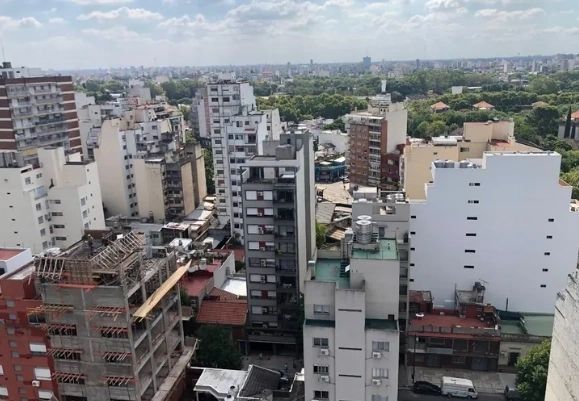BuySellBA
Administrator
The mortgage brake hits the real estate market and raises questions until the October elections - Ambito Financiero

Source:

 www.ambito.com
www.ambito.com
September 09, 2025
By Jose Luis Cieri
The ruling party's defeat in the province of Buenos Aires and the banks' suspension of mortgage loans have put appraisals, deeds, and projects on hold.

The dollars in the cushion could drive operations without credit, as was the case until 18 months ago. Depositphotos
The Argentine real estate market has once again become trapped in the logic of politics . The outcome of the elections in the province of Buenos Aires, with the defeat of the ruling party , generated a shock of uncertainty that has a direct impact on operations.
Appraisals on hold, mortgages on hold (banks were already pushing sharp rate hikes and tightening conditions, coupled with the scoring system that now makes mortgage access nearly impossible), and developers on the defensive are the key factors in a scenario that will continue until at least October.
In September, they explain, deeds will still be seen ( almost 1,400 were executed in July, 519.1% compared to the same month last year ), but they are the concretization of agreements reached before the election results. The unknown is what will happen starting in October, when the true pulse of the market becomes apparent without that prior drag.
This is no small matter: currently, nearly 20% of deeds are executed with a mortgage. Furthermore, each mortgage typically generates one or two additional transactions, either because the family buying the property unlocks another property or because the investor with the loan drives growth in lower-income segments. "Without mortgage loans, the market loses those opportunities," Dbsie emphasized.
In this year and a half of lending, the most affordable properties were the most sought after, and their prices rose, driven by that demand. Dbsie noted: "If lending disappears, demand from those seeking financing will decline, and with supply still very high, prices will stagnate."
Along the same lines, Schachter noted that banks currently have better investment instruments than mortgage loans: "With limited liquidity and excess demand, coupled with the current interest rate level, the business is different. If credit dries up and the elections don't bring calm, expectations will become 100% negative, with falling prices and operations."
Schachter also noted that banks face limits due to reserve requirements and the difficulty of securitizing loans, which discourages the supply of mortgage loans.
Germán Gómez Picasso , of Reporte Inmobiliario, downplayed the immediate impact: "In this case, the result would be practically neutral because no new units are being financed ( and banks are not lending on divisible mortgages, which are already regulated ). The credit would benefit developers over a three- to four-year horizon, not now."

The post-election real estate market in the province of Buenos Aires is moving cautiously, between the electoral pause and the mortgage freeze (Photo courtesy of San Román Properties)
In any case, developers have already begun to slow down launches and strengthen direct financing schemes. With longer dollar-denominated plans and peso-denominated installments tied to the construction index, they are seeking to sustain sales in a more cautious environment.
Claudio Rinaldo , owner of Nico Propiedades, emphasized that the Argentine real estate market has always been a very sensitive indicator of economic and political ups and downs. “Today, the sector is at a turning point. It was showing signs of recovery after years of setbacks, but everything will depend on the government managing to sustain itself and provide predictability. If it stays on course, a period of consolidation may arrive; if not, a new cycle of uncertainty would be a severe blow to a market that was just beginning to recover.”
For Rinaldo, caution will guide every decision in the coming weeks: the future of bricks and mortar, once again, is tied to what the ballot box determines and the official's ability to inspire confidence.
Rents, meanwhile, maintain their own dynamics without the 2020 Rental Law. Demand remains strong, and the average supply of 15,000 units is sustained with prices slightly above inflation for new contracts. The political noise did not alter this segment. Although prices are high, for example, for a new contract, it is difficult to find 3-bedroom apartments for less than $650,000 per month.
The political variable became the decisive factor. The mortgage cutoff, the postponement of projects, and the decline in reserves all reflect the same common denominator: uncertainty.
Gómez Picasso summed up the expectations: "The key lies in what happens with the dollar and inflation through October. If the situation remains under control, the market will remain paused but stable. If not, the impact will be greater."
www.buysellba.com

Source:

El freno hipotecario golpea al mercado inmobiliario y abre dudas hasta las elecciones de octubre
La derrota oficialista en la provincia de Buenos Aires y el corte de créditos hipotecarios por parte de los bancos ponen en pausa tasaciones, escrituras y proyectos.
September 09, 2025
By Jose Luis Cieri
The ruling party's defeat in the province of Buenos Aires and the banks' suspension of mortgage loans have put appraisals, deeds, and projects on hold.

The dollars in the cushion could drive operations without credit, as was the case until 18 months ago. Depositphotos
The Argentine real estate market has once again become trapped in the logic of politics . The outcome of the elections in the province of Buenos Aires, with the defeat of the ruling party , generated a shock of uncertainty that has a direct impact on operations.
Appraisals on hold, mortgages on hold (banks were already pushing sharp rate hikes and tightening conditions, coupled with the scoring system that now makes mortgage access nearly impossible), and developers on the defensive are the key factors in a scenario that will continue until at least October.
Operators agree that a 30- to 60-day period of decision-making pause has begun on the banking side. Architect and real estate consultant Alan Schachter summarized it this way: "If mortgage lending is cut off, we won't see an immediate impact, but we will see it in four to six months. Inertia sustains the market for a while, but if the credit cessation continues beyond the electoral period, trading levels will slow down."In September, they explain, deeds will still be seen ( almost 1,400 were executed in July, 519.1% compared to the same month last year ), but they are the concretization of agreements reached before the election results. The unknown is what will happen starting in October, when the true pulse of the market becomes apparent without that prior drag.
In trouble
Bank financing, which had revived operations over the last year and a half, is now facing an abrupt halt. Sebastián Dbsie , of SD Propiedades, described the impact in detail: “The effects of the credit cutoff are already being felt. In many transactions with pre-approved loans, the banks decided to suspend issuing them. Even notaries, who used to process several mortgage deeds per day, will have their schedules empty starting in October because no new files are being assigned to them.”This is no small matter: currently, nearly 20% of deeds are executed with a mortgage. Furthermore, each mortgage typically generates one or two additional transactions, either because the family buying the property unlocks another property or because the investor with the loan drives growth in lower-income segments. "Without mortgage loans, the market loses those opportunities," Dbsie emphasized.
In this year and a half of lending, the most affordable properties were the most sought after, and their prices rose, driven by that demand. Dbsie noted: "If lending disappears, demand from those seeking financing will decline, and with supply still very high, prices will stagnate."
Economic reasons for the brake
The key question is why mortgage lending is being cut off when it was working. Debsie explained that "just as the major variables once aligned to launch lending—low inflation, stable dollar, liquid banks, low rates—the opposite is happening today. The dollar is at the limit of its range, banks raised rates to absorb pesos, and delinquency rates on loans already granted increased. That's why they decided to stop lending."Along the same lines, Schachter noted that banks currently have better investment instruments than mortgage loans: "With limited liquidity and excess demand, coupled with the current interest rate level, the business is different. If credit dries up and the elections don't bring calm, expectations will become 100% negative, with falling prices and operations."
Schachter also noted that banks face limits due to reserve requirements and the difficulty of securitizing loans, which discourages the supply of mortgage loans.
Impact on construction
The mortgage crisis is also impacting construction and the planning of new projects. For Dbsie, the lack of credit could reactivate the sale of properties in the pit: "For many, the only way to buy is through bank financing or installment payments on a development project. If credit disappears, the pit will be the alternative."Germán Gómez Picasso , of Reporte Inmobiliario, downplayed the immediate impact: "In this case, the result would be practically neutral because no new units are being financed ( and banks are not lending on divisible mortgages, which are already regulated ). The credit would benefit developers over a three- to four-year horizon, not now."

The post-election real estate market in the province of Buenos Aires is moving cautiously, between the electoral pause and the mortgage freeze (Photo courtesy of San Román Properties)
In any case, developers have already begun to slow down launches and strengthen direct financing schemes. With longer dollar-denominated plans and peso-denominated installments tied to the construction index, they are seeking to sustain sales in a more cautious environment.
Diverging expectations
The outlook for the coming months is nuanced. Gómez Picasso stated that, even with higher rates, demand could be sustained: “People can't buy in cash, rents are very expensive, the housing shortage is growing, and sales prices remain low. Mortgage loans often function as a complement, and even with high rates, they're still better than renting.”Claudio Rinaldo , owner of Nico Propiedades, emphasized that the Argentine real estate market has always been a very sensitive indicator of economic and political ups and downs. “Today, the sector is at a turning point. It was showing signs of recovery after years of setbacks, but everything will depend on the government managing to sustain itself and provide predictability. If it stays on course, a period of consolidation may arrive; if not, a new cycle of uncertainty would be a severe blow to a market that was just beginning to recover.”
For Rinaldo, caution will guide every decision in the coming weeks: the future of bricks and mortar, once again, is tied to what the ballot box determines and the official's ability to inspire confidence.
What's for sale and rentals
Beyond credit, the market is organized according to a clear pattern: flight to quality. Used apartments in good locations and well-priced continue to find buyers. The rest, however, do not. The real estate sector confirmed that: "What's well-priced and in an A-list location sells. What's not, remains frozen."Rents, meanwhile, maintain their own dynamics without the 2020 Rental Law. Demand remains strong, and the average supply of 15,000 units is sustained with prices slightly above inflation for new contracts. The political noise did not alter this segment. Although prices are high, for example, for a new contract, it is difficult to find 3-bedroom apartments for less than $650,000 per month.
The political variable became the decisive factor. The mortgage cutoff, the postponement of projects, and the decline in reserves all reflect the same common denominator: uncertainty.
Gómez Picasso summed up the expectations: "The key lies in what happens with the dollar and inflation through October. If the situation remains under control, the market will remain paused but stable. If not, the impact will be greater."
www.buysellba.com

